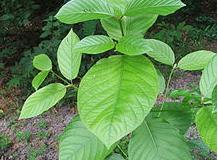
Enthusiasts of the supplement kratom, derived from the leaves of the Mitragyna Speciosa tree, have been giving the DEA, the FDA and us a hard time lately, in the case of the government because they want to ban it due to a huge surge in poisonings and in our case since we called for the substance to be regulated just like any other drug. Some supporters don't even believe that it is a drug, but it certainly is. Here's why.
First, the definition from the FDA website (emphasis mine):
"A drug is defined as: A substance recognized by an official pharmacopoeia or formulary. A substance intended for use in the diagnosis, cure, mitigation, treatment, or prevention of disease. A substance (other than food) intended to affect the structure or any function of the body"
For the most part, this definition is clear, though there are some cases that might surprise you - because it is or isn't, depending on the dose. Here is a list of a few such cases, along with explanations.
- Niacin (vitamin B3), 15 mg per day— Dietary supplement, not a drug.
- Niacin 3,000-6,000 mg per day— Yes. It is now a drug, which is used to lower cholesterol. At this dose it fits the FDA definition: "Mitigation, treatment, prevention" (Note: This is an example of how the same chemical can be considered to be either a drug or not, depending on dose.)
- Vitamin C (ascorbic acid), 50 mg per day— Dietary supplement, not a drug.
- Vitamin C, 1,000 mg per day— This one is tricky. If large doses of vitamin C do nothing, then, by definition, it cannot be a drug. If it really "prevented" colds, then it would be a drug. Most evidence shows that it does not. Assuming this is correct, then vitamin C would not be a drug because of the lack of any medical use.
- Caffeine in coffee: This one is a gray area— "Other than food". If coffee is considered to be a food, then caffeine would technically not be a drug. But if you are drinking it to wake up, then it would be. Good luck figuring this one out. Better have some coffee first.
- No Doz: Yes. A drug for sure. One caplet contains 200 mg of caffeine—the amount found in two cups of coffee— and is taken solely to keep you awake or alert. "Any function of the body"
- Glucose when given by IV: Yes. "Mitigation, treatment"
- Glucose in an apple: No.
- St. John's Wort: Yes. Even though it is an herb, it has some use in treating depression."Mitigation, treatment"
- Prozac: Yes. Just like St. John's Wort, except it works better. "Mitigation, treatment"
So, while the definition of a drug is usually quite clear, there are some strange instances where it may or not be, depending on dose and pharmacological effect. Now, let's look at two more:
Morphine: Obviously yes, it is an analgesic drug. Morphine is the most abundant opiate (1) that is found in opium, a latex gum that is isolated from the opium poppy. "Mitigation, treatment"
Kratom: Yes.
For all of you are ready to argue, consider the following:

* There are multiple claims about the pharmacological effects of kratom. These include analgesia, easing the withdrawal from heroin and similar opiates, antidepressant, anti anxiety, anti diarrheal, stimulant, others.
** The principal psychotropic components in kratom are mitragynine and 7-hdroxymitragynine. Both are agonists for certain opioid receptor and partial agonists for others. It is impossible to characterize the binding of other four dozen chemical compounds in kratom.
So, the answer to the question "Is kratom a drug?" can be "no"—but only because it is a mixture of drugs.



